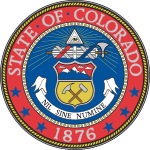The 100 seats in the United States Senate are divided into three classes for the purpose of determining which seats will be up for election in any two-year cycle, with only one class being up for election at a time. With senators being elected to fixed terms of six years, the classes allow about a third of the seats to be up for election in any presidential or midterm election year instead of having all 100 be up for election at the same time every six years. The seats are also divided in such a way that any given state's two senators are in different classes so that each seat's term ends in different years. Class 1 and class 2 consist of 33 seats each, while class 3 consists of 34 seats. Elections for class 1 seats are scheduled to take place in 2024, class 2 in 2026, and the elections for class 3 seats in 2028.

The Colorado General Assembly is the state legislature of the State of Colorado. It is a bicameral legislature consisting of the Senate and House of Representatives that was created by the 1876 state constitution. Its statutes are codified in the Colorado Revised Statutes (C.R.S.). The session laws are published in the Session Laws of Colorado.

The Colorado State Senate is the upper house of the Colorado General Assembly, the state legislature of the US state of Colorado. It is composed of 35 members elected from single-member districts, with each district having a population of about 123,000 as of the 2000 census. Senators are elected to four-year terms, and are limited to two consecutive terms in office. Senators who are term-limited become eligible to run again after a one-term respite.
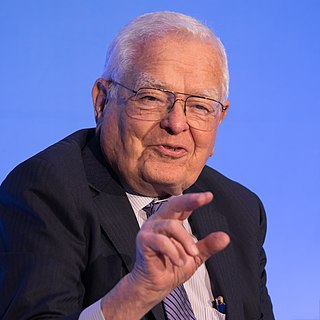
Roy Rudolf Romer is an American politician who served as the 39th Governor of Colorado from 1987 to 1999, and subsequently as the superintendent of the Los Angeles Unified School District from 2000 to 2006.
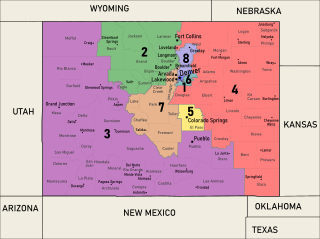
Since Colorado became a U.S. state in 1876, it has sent congressional delegations to the United States Senate and United States House of Representatives, beginning with the 44th United States Congress. Prior to statehood, the Colorado Territory sent non-voting delegates to the House of Representatives from 1861 to 1876. Each state elects two senators to serve for six years, and members of the House to two-year terms. Each state elects two senators to serve for six years in general elections, with their re-election staggered. Prior to the ratification of the Seventeenth Amendment in 1913, senators were elected by the Colorado General Assembly. Each state elects a varying number of, but at least one, member of the House, depending on population, to two-year terms. Colorado has sent eight members to the House in each congressional delegation since the 2020 United States Census.

Since Utah became a U.S. state in 1896, it has sent congressional delegations to the United States Senate and United States House of Representatives. Each state elects two senators to serve for six years. Before the Seventeenth Amendment in 1913, senators were elected by the Utah State Legislature. Members of the House of Representatives are elected to two-year terms, one from each of Utah's four congressional districts. Before becoming a state, the Territory of Utah elected a non-voting delegate at-large to Congress from 1850 to 1896.

The Tennessee Senate is the upper house of the U.S. state of Tennessee's state legislature, which is known formally as the Tennessee General Assembly.

The 1972 United States Senate elections were held on November 7, with the 33 seats of Class 2 contested in regular elections. They coincided with the landslide re-election of Republican President Richard Nixon. Despite Nixon's landslide victory, Democrats increased their majority by two seats. The Democrats picked up open seats in Kentucky and South Dakota, and defeated four incumbent senators: Gordon Allott of Colorado, J. Caleb Boggs of Delaware, Jack Miller of Iowa, and Margaret Chase Smith of Maine. The Republicans picked up open seats in New Mexico, North Carolina, and Oklahoma, and defeated one incumbent, William B. Spong Jr. of Virginia.

The 1966 United States Senate elections were elections on November 8, 1966, for the United States Senate which occurred midway through the second term of President Lyndon B. Johnson. The 33 seats of Class 2 were contested in regular elections. Special elections were also held to fill vacancies. With divisions in the Democratic base over the Vietnam War, and with the traditional mid-term advantage of the party not holding the presidency, the Republicans took three Democratic seats, thereby breaking Democrats' 2/3rds supermajority. Despite Republican gains, the balance remained overwhelmingly in favor of the Democrats, who retained a 64–36 majority. Democrats were further reduced to 63–37, following the death of Robert F. Kennedy in June 1968.
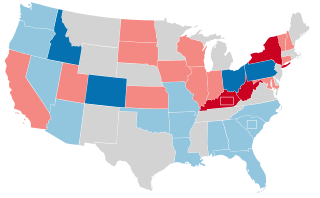
The 1956 United States Senate elections were elections for the United States Senate that coincided with the re-election of President Dwight D. Eisenhower. The 32 seats of Class 3 were contested in regular elections, and three special elections were held to fill vacancies. Although Democrats gained two seats in regular elections, the Republicans gained two seats in special elections, leaving the party balance of the chamber unchanged.
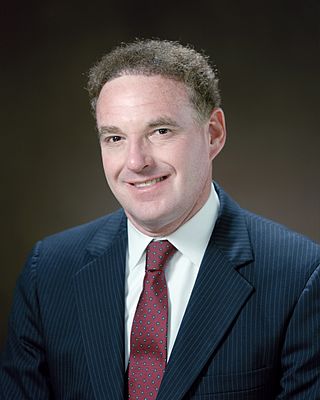
Kenneth Bentley Kramer is an American lawyer, politician, and jurist from Colorado. He is a former Republican member of the United States House of Representatives, serving four consecutive terms from 1979 to 1987.

The 2002 United States Senate election in Colorado was held on November 5, 2002. Incumbent Republican U.S. Senator Wayne Allard won re-election to a second term. This is also the last time the sitting US Senator of this seat won reelection, as well either party held this seat for two consecutive terms.

The 1876–77 United States Senate elections were held on various dates in various states, coinciding with Rutherford B. Hayes's narrow election as president. As these U.S. Senate elections were prior to the ratification of the Seventeenth Amendment in 1913, senators were chosen by state legislatures. Senators were elected over a wide range of time throughout 1876 and 1877, and a seat may have been filled months late or remained vacant due to legislative deadlock. In these elections, terms were up for the senators in Class 2.
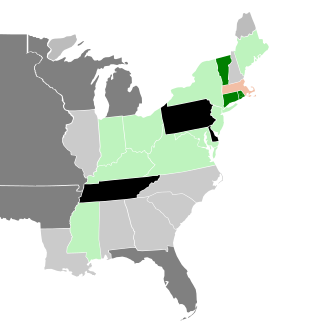
The 1820–21 United States Senate elections were held on various dates in various states, corresponding with James Monroe's landslide re-election. As these U.S. Senate elections were prior to the ratification of the Seventeenth Amendment in 1913, senators were chosen by state legislatures. Senators were elected over a wide range of time throughout 1820 and 1821, and a seat may have been filled months late or remained vacant due to legislative deadlock. In these elections, terms were up for the senators in Class 1.

The 1980 United States Senate election in Colorado was held on November 4, 1980. Incumbent Democratic U.S. Senator Gary Hart won re-election to a second term despite Republican nominee Ronald Reagan winning the state over Democratic President Jimmy Carter in the concurrent presidential election. This election was the first time since 1948 that an incumbent Democratic Senator from Colorado was re-elected or won re-election and the first time since 1938 that an incumbent Democratic Senator from Colorado was re-elected or won re-election for this seat.
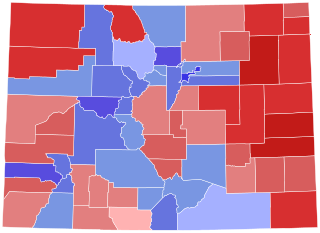
The 2022 United States Senate election in Colorado was held on November 8, 2022, to elect a member of the United States Senate to represent the State of Colorado. Incumbent Democratic Senator Michael Bennet won reelection to a third full term, defeating Republican businessman Joe O'Dea. Originally appointed to the seat in 2009, Bennet won full terms in 2010 and 2016.

The 1966 United States Senate election in Kentucky took place on November 8, 1966. Incumbent Republican Senator John Sherman Cooper was elected to a second consecutive term in office, defeating Democrat John Y. Brown Sr. in a rematch of the 1946 special election.

